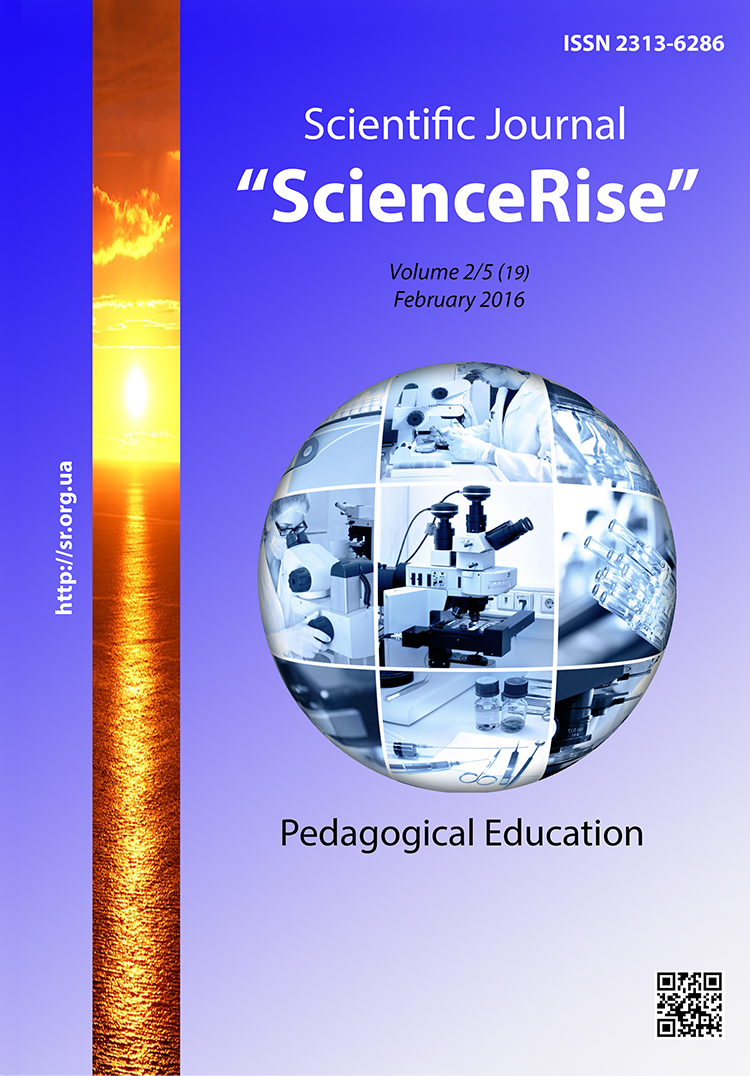Инновационная модель физкультурно-спортивного сопровождения обучения в ВУЗе студентов с ограниченными возможностями здоровья
DOI:
https://doi.org/10.15587/2313-8416.2016.60902Ключові слова:
студент с ограниченными возможностями здоровья, нозология, физкультура, спорт, физкультурно-спортивное сопровождениеАнотація
Представлено обоснование физкультурно-спортивного сопровождения обучения в ВУЗе студентов с ограниченными возможностями здоровья. В эксперименте принимали участие студенты с нозологиями: зрения, слуха, опорно-двигательного аппарата и ДЦП, с соматическими заболеваниями и с сахарным диабетом. Обоснованы организационно-методические аспекты физического воспитания и спорта студентов с разными нозологиями. Показана эффективность новой модели физического воспитания студентов с ограниченными возможностями здоровья в педагогическом процессе современного ВУЗа
Посилання
Iermakov, S. S., Ivashchenko, S. N., Guzov, V. V. (2012). Features of motivation of students to application of individual programs of physical self-preparation. Physical education of students, 4, 59–61.
Nosko, N. A. (2009). Increasing the level of physical activity as a factor of strengthening of health of pupils and students. Bulletin of the Chernihiv state pedagogical University. T. G. Shevchenko, 69, 144–150.
Tomenko, A., Lazorenko, S. (2010). Level of somatic health and motive activity of students of higher educational institutions. Slobozhansky scientific and sport Bulletin, 2, 17–20.
Vinnik, D. P. (Ed.) (2010). Adaptivnoe fizicheskoe vospitanie i sport. Kyiv: Olympic Literature, 608.
Boiko, G. N. (2010). The criteria of psychological effectiveness of the implementation of the system of psychological and pedagogical support in sports of persons with disabilities. Pedagogics, psychology, medical-biological problems of physical training and sports, 2, 23–26.
Evseev, S. P. (2010). Adaptive physical culture in rehabilitation and social adaptation of persons with disabilities. Chep. 1. Physical culture and sport in modern society. Smolensk, CAPXT, 11–17.
Adyrkhaev, S. G. (2013). Organizational-pedagogical bases of physical education of students with special needs in higher education. Kyiv: University "Ukraine", 381.
Apanasenko, G. L, Dolzhenko, L. P. (2007). The health and physiological reserves of the body. Theory and methodology of physical education and sport, 1, 17–21.
Shevtsov, G. A. (2009). Systematic approach to the organization of integrated education for students with limited activity in higher educational establishment. Social-pedagogical rehabilitation of educational institutions: problems and prospects. Khmelnitsky, HTUU, 22–24.
Adyrhajev, S. G. (2013). Fizychna kul'tura v zhytti studentiv z obmezhenymy mozhlyvostjamy zdorov’ja. Pedagogika, psyhologija ta medyko-biologichni problemy fizychnogo vyhovannja i sportu, 12, 3–9. doi: 10.6084/m9.figshare.879634
Gruzevich, T. Y., Vorobyov, M. I., Bezverkhnii, G. V. (2011). Control picname vihaan children, pdldf I molodi: uaichalni posebni. Kyiv: Olimpiska literature, 224.
Shark-Eckardt, M., Piece, M., Zakowska, H., Iermakov, S. S. (2012). Substantiation of increase of motor activity of disabled people living in the Kujawsko-Pomorskie region. Physical education of students, 3, 136–144.
Adyrkhaiev, S. G. (2014). Psychophysical condition of visually impaired students during physical education classes. European Scientific Journal,10 (3), 62–69.
Adyrkhaiev, S. G. (2014). Optimization of the motor activity of students suffering from diabetes mellitus during physical education classes. European Scientific Journal, 10 (6), 72–81.
Bondar, T. I. (2014). Developing the inclusive setting in higher education institutions in Ukraine. Science and Education a New Dimension. Pedagogy and Psychology, II (27), 20–24. Available at: http://seanewdim.com/uploads/3/2/1/3/3213611/bondar_t.i._developing_the_inclusive_setting_in_higher_education_institutions_in_ukraine.pdf
##submission.downloads##
Опубліковано
Номер
Розділ
Ліцензія
Авторське право (c) 2016 Сослан Георгиевич Адырхаев

Ця робота ліцензується відповідно до Creative Commons Attribution 4.0 International License.
Наше видання використовує положення про авторські права Creative Commons CC BY для журналів відкритого доступу.
Автори, які публікуються у цьому журналі, погоджуються з наступними умовами:
1. Автори залишають за собою право на авторство своєї роботи та передають журналу право першої публікації цієї роботи на умовах ліцензії Creative Commons CC BY, котра дозволяє іншим особам вільно розповсюджувати опубліковану роботу з обов'язковим посиланням на авторів оригінальної роботи та першу публікацію роботи у цьому журналі.
2. Автори мають право укладати самостійні додаткові угоди щодо неексклюзивного розповсюдження роботи у тому вигляді, в якому вона була опублікована цим журналом (наприклад, розміщувати роботу в електронному сховищі установи або публікувати у складі монографії), за умови збереження посилання на першу публікацію роботи у цьому журналі.

